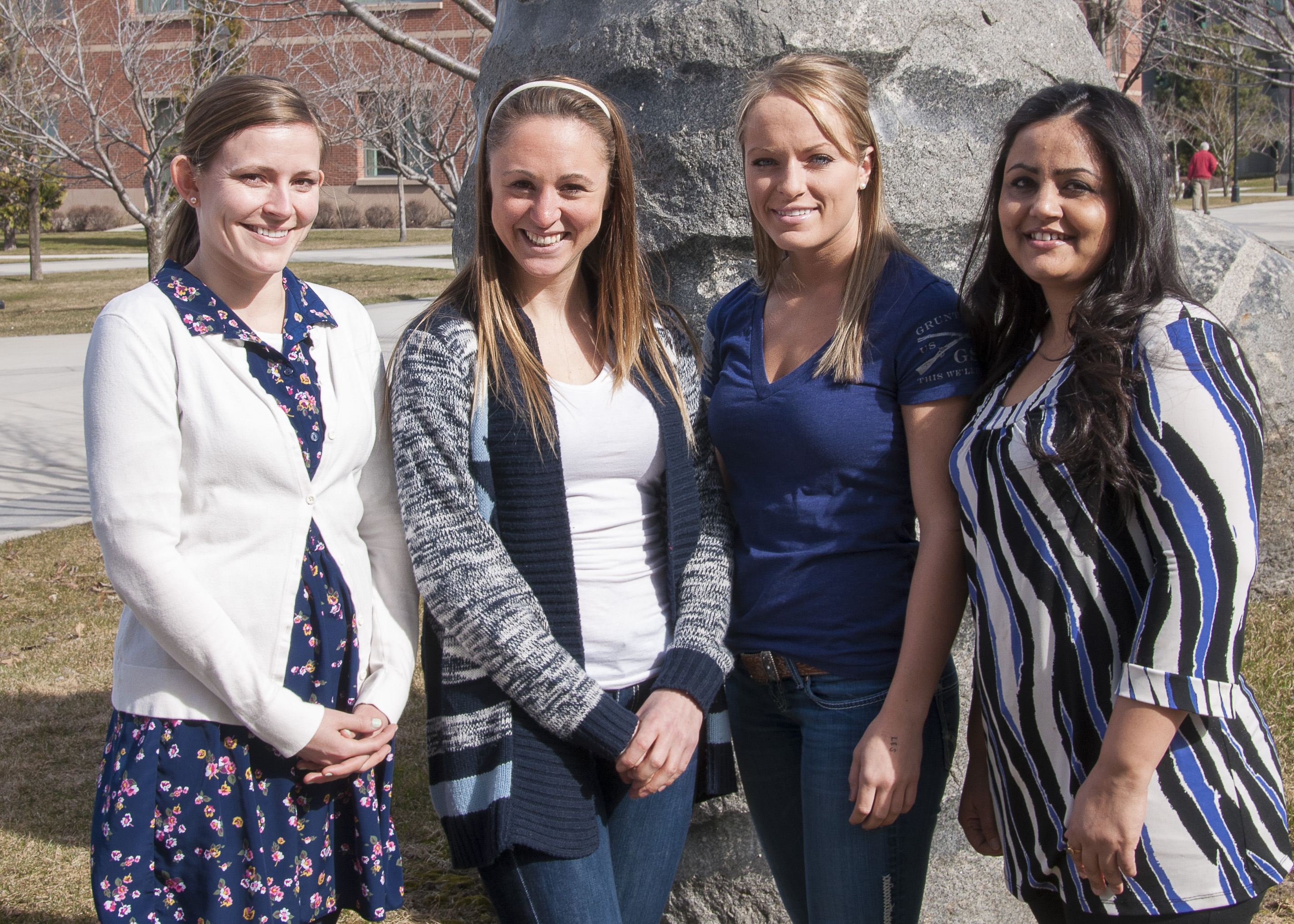Nursing Students Gain Experience Treating Mental Illness and the Homeless

L-R: Danica Parkin, WSU College of Nursing Instructor, and nursing students Amanda-Myers-Nijmeh, Crystal Johnson and Sonia Kaur participated in the Homeless Connect event at the Salvation Army.
(Ed. Note: The latest edition of the WSU Spokane Magazine is available as a PDF here. It is also distributed statewide to WSU alumni and friends. We will share a story each day from the latest issue on the blog. Enjoy!)
By Alli Benjamin and Kevin Dudley
The National Alliance on Mental Health estimates nearly 19 percent of adults experience mental illness in a given year. Between 26 and 46 percent of homeless adults live with mental illness.
Treating those individuals requires a certain kind of care.
The WSU College of Nursing includes several fields in nursing, from Bachelor of Science nurses who provide basic health care to nurse practitioners who have a master’s or doctorate. Both levels and in between are working with the homeless.
In most cases, a nurse is the frontline provider for mental health and psychiatric conditions of homeless individuals when they come to a clinic or a hospital.
Psychiatric/mental health nurse practitioners (PMHNPs) have the potential to blend counseling with the medical management and ongoing assessment that can occur in treating those with chronic mental illness.
Cindy Fitzgerald, Ph.D., is the director of the Doctor of Nursing Practice program at the WSU College of Nursing in Spokane. Fitzgerald emphasizes the holistic approach psychiatric nurse practitioners use when working with patients suffering from a mental illness.
“They can assess, diagnose, and treat families and individuals with psychiatric disorders,” she said. “Essentially, they manage mental health with medication or therapeutic intervention such as group therapy, one-on-one therapy, or other types of counseling.”
Education and training for the PMHNP role is also important and can be fairly specialized.
Most nurse practitioners begin with earning their master’s or doctorate specializing in this area, and then complete the national exam. From there, ongoing education is mandatory, and this is where individuals choose techniques and methods to specialize in: private practice, community health clinics, or hospitals.
“I am hopeful that we will see an expanded appreciation on the roles PMHNP can play as we move into a more inter-professional care model where the patient is the center of the care plan,” Fitzgerald said. “Psychiatric nurse practitioners understand how to engage with patients around making behavior change. We can all learn a lesson about that.”
The mental aspect nurses treat is one part of the job when caring for the homeless. Treating physical needs is another.
WSU Spokane nursing students train in the state-of-the-art simulation lab on campus in an interdisciplinary setting.
Students Get a Dose of Reality
At a January event called “Homeless Connect” at the Salvation Army, students from the WSU College of Nursing got a glimpse into what they will be doing in hospitals and clinics after graduation. Homeless Connect offers a “one-stop shop” for homeless, at-risk and low-income families, said Danica Parkin, an instructor in the College of Nursing.
“Our nursing students go because it’s a good experience for them to come in contact with homeless people and see what kinds of barriers they’re facing and hear about their experiences,” she said.
The event is put on by the Spokane Homeless Coalition, which is comprised of various nonprofits, churches, social services and other community groups.
“We recognize that our services are spread out,” said James Ochiltre of SNAP, a member of the coalition. “We’re all doing similar things but working all over the place. (At Homeless Connect) we’re in the same location for a day.”
Students helped check blood sugar levels and blood pressure, answered general health questions, and conducted foot care, which often involved washing feet, providing clean socks, clipping toe nails and more.
Parkin’s students attended the event as part of their clinical group.
“After participating in Homeless Connect, I realized just how essential preventative care is when using a holistic approach to improve the health of the homeless population,” said Katherine, one WSU nursing student who participated in the event (and asked that her last name be withheld).
Parkin said this event is a great opportunity for students because as nurses they will encounter underserved populations in one way or another.
“The reality is, homeless people come to the hospital,” she said. “They end up in the ER, they go through ICU. You’re going to come in contact with them if you work in health care, so it’s good to have an understanding of their situation.”
Treating both the mental and physical impacts homelessness has on a person is something nursing students at WSU Spokane are learning with real-world experiences and advanced degree opportunities.

